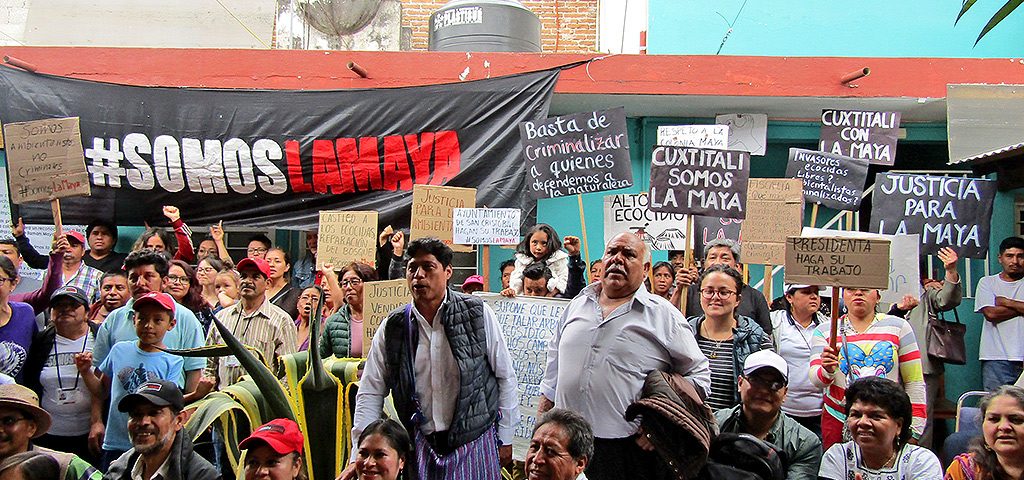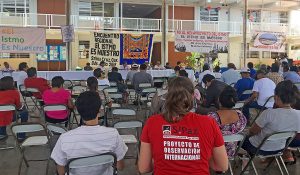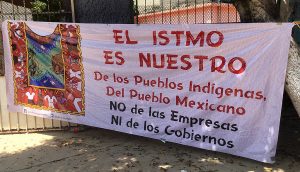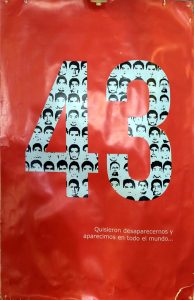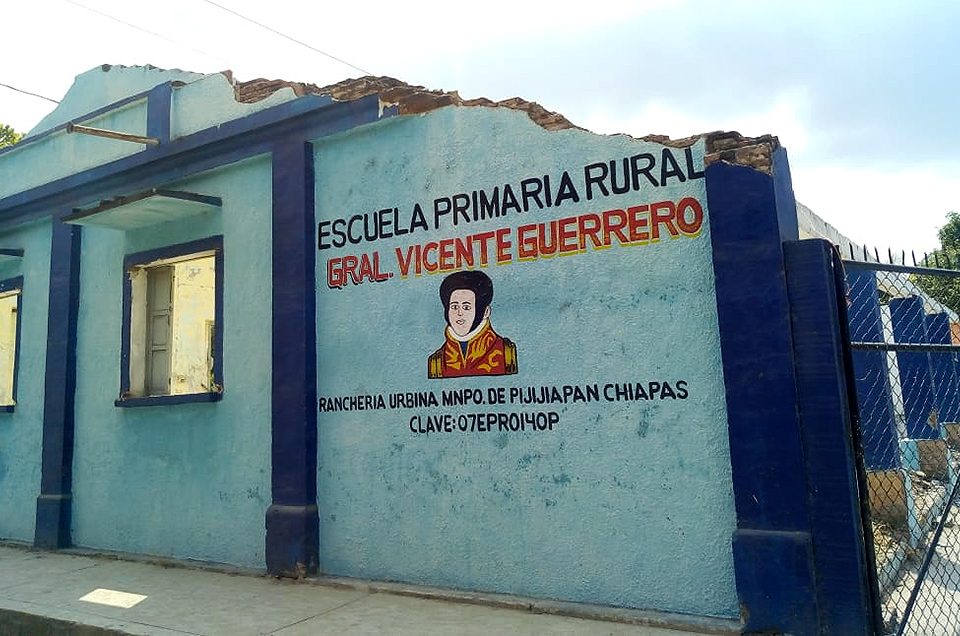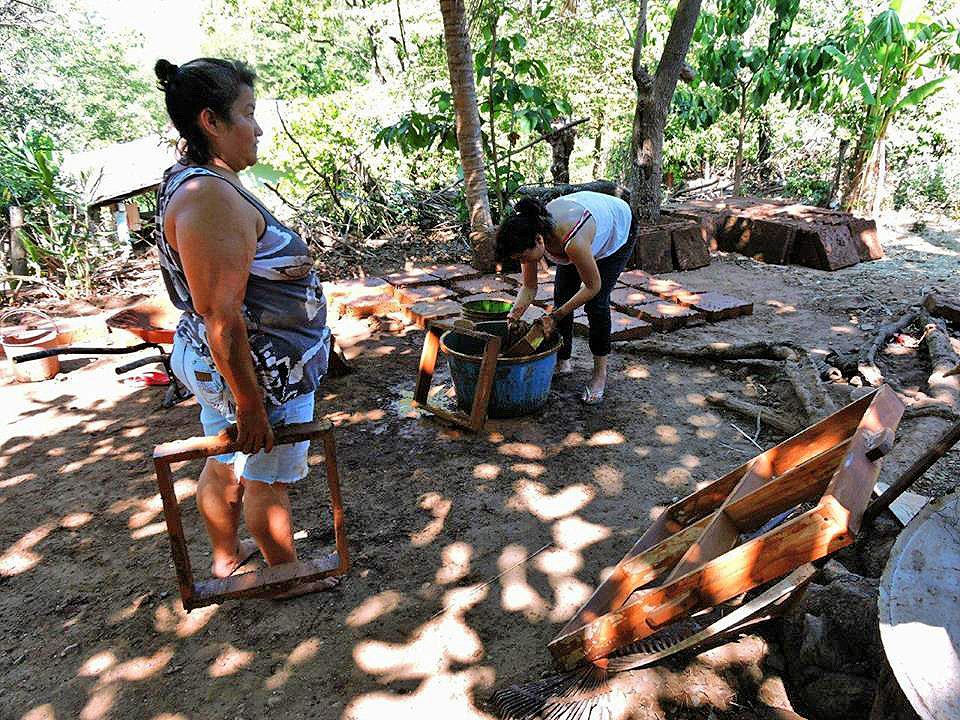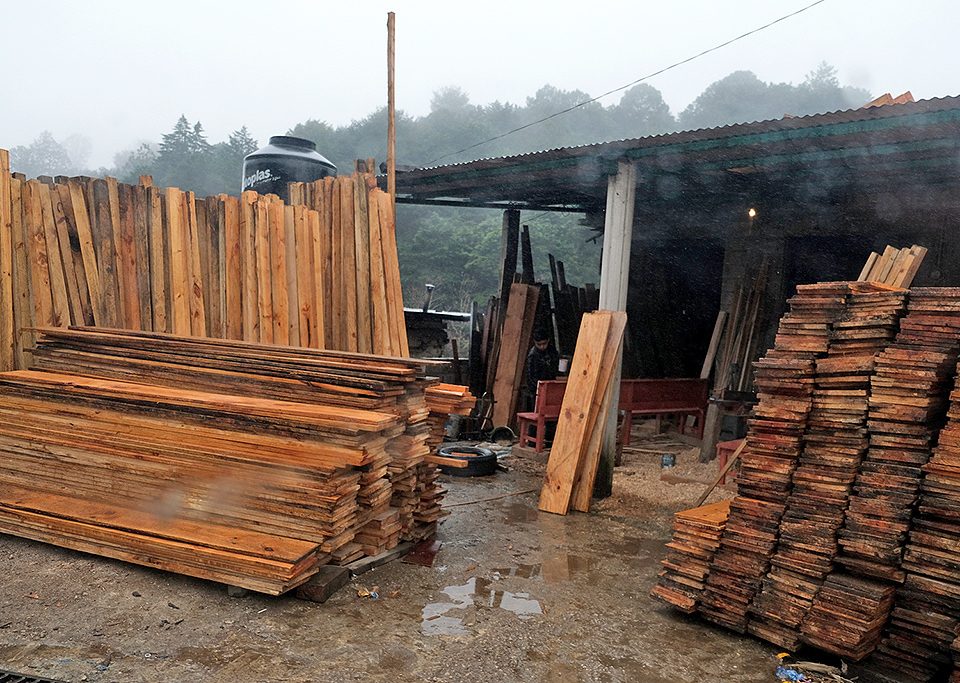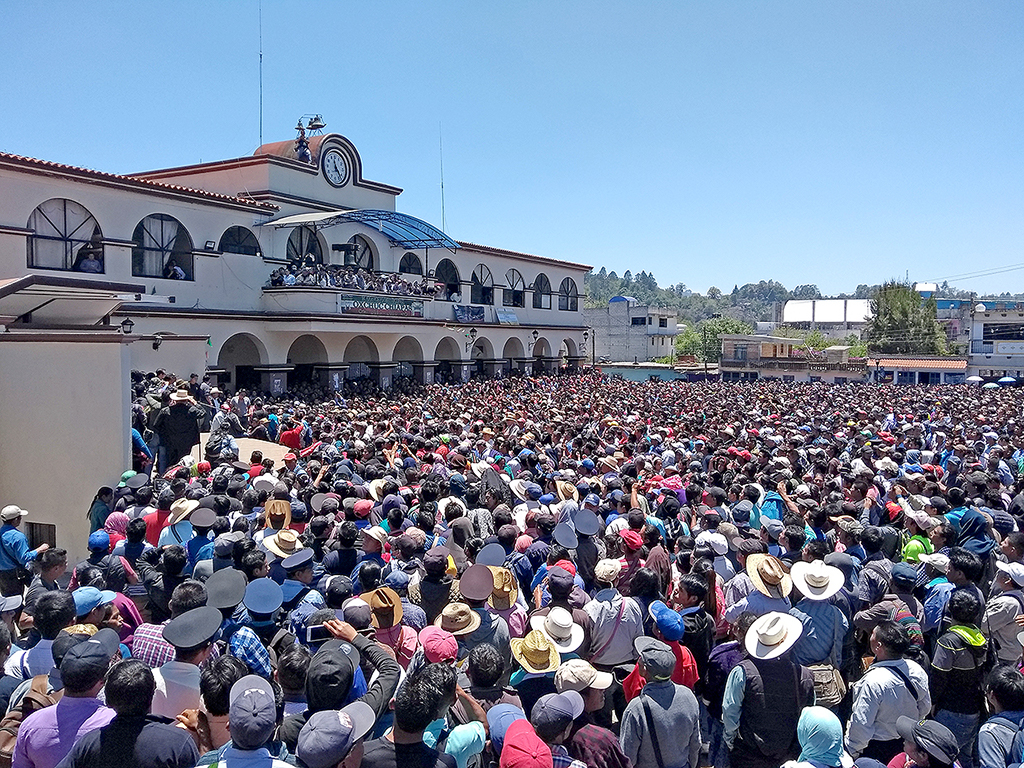
SIPAZ activities (From mid-February to mid-May 2019)
22/06/2019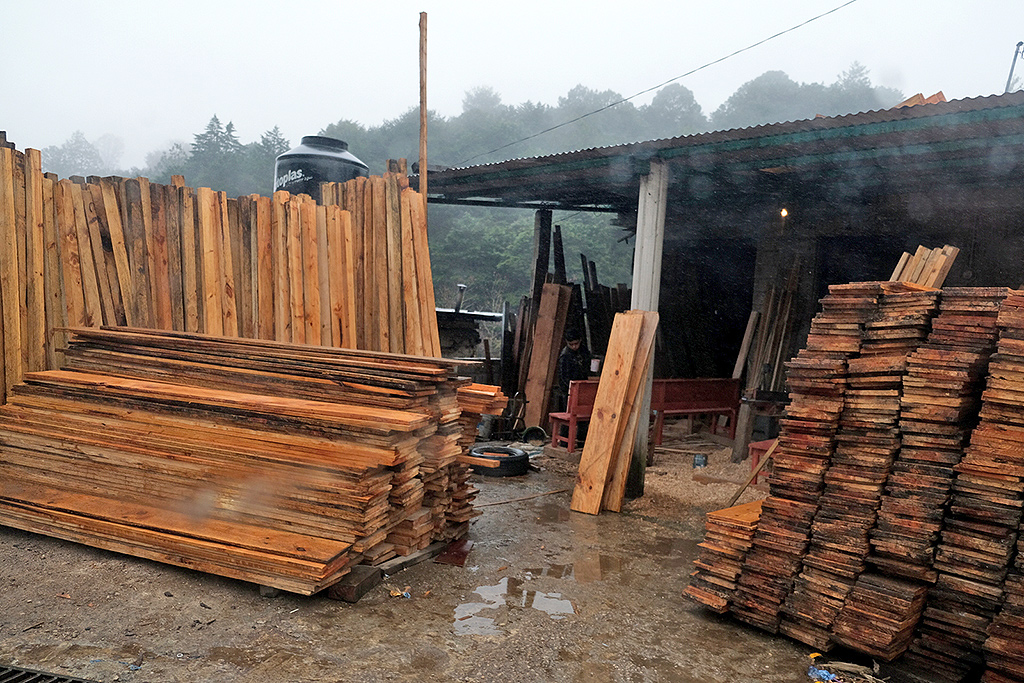
FOCUS: Between deforestation and poor reforestation – Mexico, a country of authorized ecological destruction
27/09/2019In June, US President Donald Trump threatened to apply a 5% tax on Mexican products if Mexico did not stop irregular immigration.
An agreement was reached in which Mexico agreed to take “strong measures” to contain the flow of migrants, something that began the day before the agreement when it was announced that the border with Guatemala will be reinforced with the deployment of 6,000 members of the newly created National Guard. The agreement also explicitly states that Mexico will take “decisive measures to dismantle human trafficking and smuggling organizations, as well as their illegal financial and transportation networks.” It notes that, “those who cross the southern border of the United States to seek asylum will be quickly returned to Mexico, where they can wait for the adjudication of their applications” while “Mexico will authorize the entry of all those people [and] offer employment, health, and education according to its principles.” Finally, the United States affirmed the comprehensive development plan for the region driven by Mexico in coordination with El Salvador, Guatemala, and Honduras. The agreement states that, in the event that the measures adopted do not have the expected results, others will be taken.
In addition to the deployment on the Southern Border, 15,000 troops were mobilized on the Northern Border, Luis Cresencio Sandoval the secretary of National Defense revealed. He said that “considering that migration is not a crime, it is an administrative offense, so we stop them and charge them” referring to the National Institute of Migration (INM in its Spanish acronym). Andres Manuel Lopez Obrador (AMLO) confirmed that the National Guard does carry out arrests of migrants as an aid to the INM. He stated that, “the instruction that everyone has is to respect the human rights of migrants.”
Civil organizations have questioned the “double discourse” of AMLO’s government, which went from a humanitarian strategy (with an open door policy at the beginning of the six-year term of office) to a militarist one. He was accused of having let “the administration of Donald Trump extend its border to southern Mexico.” They indicated that increased surveillance will not stop migration but will lead to riskier migration routes. Likewise, they were concerned about the tendency to criminalize migrant advocacy organizations. An example of this happened in June, when Irineo Mujica, director of Pueblos Sin Fronteras (Peoples Without Borders) and human rights defender Cristobal Sanchez, were allegedly arrested for bringing foreigners without documentation into Mexico and profiting from it. In February, the Minister for the Interior, Olga Sanchez Cordero, accused Pueblos Sin Fronteras of “recruiting” Central American migrants to participate in the caravans that have crossed Mexico to the United States since 2018. Mujica and Sanchez were released a week later but the General Prosecutor’s Office of the Republic (FGR in its Spanish acronym) stated that it would appeal this judicial decision.
Another problem is the saturation of the migratory centers that are exceeded in their capacity by up to 400% with “overcrowded conditions, without sanitation or adequate food or sufficient access to health services.” Human Rights Watch reported that “those asylum seekers from Central America, Cuba, and Africa – including 4,780 children – face ‘potentially dangerous and unsustainable conditions’ after US authorities send them back to Mexico.” The visiting National Human Rights Commission, Edgar Corzo, said that, “what happens to migrants who are taken to migratory centers are deprivations of liberty, where minimum conditions for survival and decent treatment are not guaranteed.”
Other pending human rights issues
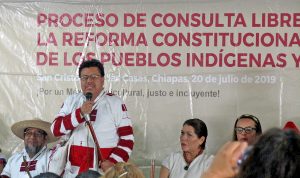
Adelfo Regino Montes, General Director of the National Institute of Indigenous Peoples, Consultation with indigenous and Afro-Mexican peoples and communities in San Cristóbal de Las Casas, July 2019 © SIPAZ
In June, the president of the National Human Rights Commission (CNDH in its Spanish acronym), Luis Raul Gonzalez Perez, regretted that AMLO had not found the time to personally receive CNDH’s 2018 annual report, as is customary. He stated that “we are beginning to accumulate facts, acts, and omissions that, seen as a whole, would lead us to assume that ensuring the validity of human rights is not being assumed as a premise and limit of all public action, nor are pertinent measures being adopted to address the situation.” The 2018 report highlights several areas of concern. As for security and justice, it underlines “the need to address the crisis that Mexico is experiencing in the area of violence and insecurity, under a comprehensive approach, based on a strategy that prioritizes prevention and is not limited to the rethinking of an eminently reactive body, such as the National Guard, as well as the increase in crimes to which pretrial detention would be applicable.” Among causes of concern, it also mentions the health sector, femicides, disappearances, attacks against journalists and human rights defenders, among others.
In June, work began on the National Human Rights Program 2019-2024 (PNDH in its Spanish acronym), which is expected to be published in December. The Minister for the Interior, Olga Sanchez Cordero, stressed that the “painful human rights crisis was inherited by the current government” and affirmed that “the reality, however difficult it may be, will not be disguised”, in particular because of the omnipresent element of impunity.
On June 21, the National Institute of Indigenous Peoples (INPI in its Spanish acronym) began “free, prior and informed consultation with indigenous and Afro-Mexican peoples and communities,” to “receive opinions, proposals and ideas on the principles and criteria that will underpin the Constitutional Reform Initiative and the corresponding regulatory laws on the rights of indigenous and Afro-Mexican peoples.” Fifty-four regional forums and one national forum were held. From the beginning, the process was criticized by different civil organizations and individuals who questioned the haste with which it was carried out. The Committee for the Integral Defense of Human Rights Gobixha A.C – Codigo DH in Oaxaca, for example, stressed that, despite the breadth of the issues to be addressed, “three phases were concentrated in one day: informative, deliberative, and consultative.” Other voices declared that rather than a consultation, the process was a way to legitimize something which was decided beforehand. The INPI reported that, based on the forums where it is estimated more than 27,000 representatives participated, it will draft a proposal to reform the Magna Carta in September.
EZLN “break the siege”
In May, the Fray Bartolome de Las Casas Center for Human Rights (Frayba) warned that “attacks on peoples, communities, and organizations are intensified as part of a strategy to contain civil and peaceful resistance in defense of territory” two years after the foundation the Constituent Assembly of the Indigenous Council of Government (CIG in its Spanish acronym) of the National Indigenous Congress (CNI in its Spanish acronym). It referred to six indigenous defenders who have been killed so far in 2019, in addition to mentioning the CNI’s complaints about situations of “dispossession, forced displacement, arbitrary detentions, enforced disappearances, threats, harassment, criminalization, and attempts to execute.” It denounced that, “this logic of war against the peoples that build autonomy is reproduced in the increase of militarization of Zapatista territories, (…) a siege that deepens with the presence of the National Guard in the region.”
In August, Subcommander Moises, spokesperson for the Zapatista Army of National Liberation (EZLN in its Spanish acronym), announced that the EZLN decided to “break the siege” forming new Caracoles and more autonomous Zapatista rebel municipalities in Chiapas. He also reported on the creation of Autonomous Resistance and Zapatista Rebellion Centers (CRAREZ in its Spanish acronym). He called for multiple events to be held with different sectors and themes. Before this announcement, AMLO declared “Welcome. Because this means working for the benefit of communities and peoples.”
Some days before, Subcommander Galeano presented an analysis of the current moment. He stated among other things that, “it rains everywhere and on everyone. At least down here. Perhaps some are just beginning to feel the cold drops stinging their body; but for others, and not just for native peoples, it rains wet: dispossession, robbery, threats, persecution, jail, disappearance, rape, blows, death … and, yes, sometimes alms.” He stressed that, “up there they declare that everything is going well” but “down here (…) everything is going wrong, and (…) it will get worse.”
Chiapas: Increasing polarization in Chilon as possible change in election method, from political parties to a system of customary methods, approaches
In June, the media reported that agents from the municipal government of Chilon began collecting signatures in a document entitled “Total rejection of elections through customary methods; yes to ballots for political parties.” Communities reported that municipal agents threatened villagers that they would lose social programs if the indigenous traditional system of holding elections were passed. A video circulated on Facebook also showed an assembly in Chilon in which the participants rejected this system, and declared themselves in favor of government support and the proposed super highway between Palenque and San Cristobal de Las Casas. Also in June, an escalation of attacks by municipal authorities of Chilon and Sitala against members of the Jesuit Mission in Bachajon was denounced. The Jesuit Mission is accompanying the indigenous movements that seek to exercise their right to self-determination in both municipalities.
Since November 2017, a petition was submitted to the Electoral and Citizen Participation Institute (IEPC in its Spanish acronym) in order to move from the system of political parties to one of customary methods. In May of this year, the National Institute of Anthropology and History (INAH in its Spanish acronym) canceled the beginning of a cultural study to confirm the indigenous origin of both municipalities and thus their right to choose their authorities as they see fit. In August, actors in favor of traditional methods denounced “the nefarious attitude of the local government of this municipality, (…), before the scheduled visit for the Cultural Study of anthropologists of the National Institute of Anthropology and History (INAH).” They detailed that in this same framework both they and the anthropologists were threatened, persecuted, and attacked, despite trying to avoid confrontations by changing the venue of the initially planned events.
For its part, a group of citizens of Chilon and Bachajon that opposes elections through customary methods, held the INAH officials and the IEPC responsible for any violent event that may occur. They also pointed to the members of the Movement in Defense of Life and Territory (MODEVITE in its Spanish acronym) and the parish priest of Chilon for seeking to “practically impose this form of election”.
Denunciations and actions against megaprojects and actors organized in defense of Mother Earth
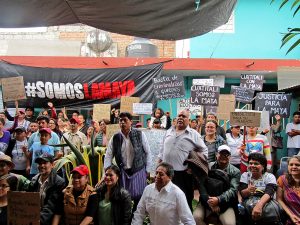
Press conference of environmentalists in the face of the criminalization of their process, San Cristóbal de Las Casas, July 2019 © SIPAZ
In May, the Social Pastoral division of the diocese of San Cristobal de Las Casas warned about the “vulnerability and greater impoverishment of our peoples due to megaprojects and new government programs”, in addition to “now applying simulated consultations with people who will not be directly affected.” It emphasized that, “we do not see a true transformation in favor of life or towards the growth and development of the population.”
In June, the Tabasco ecologist Jose Luis Alvarez Flores was found murdered in Palenque. Since 2012, Alvarez Flores was in charge of the Saraguato Environmental Management Unit (UMA in its Spanish acronym), and at various times he made accusations regarding the illegal extraction of sand and stone material from the Usumacinta River. He requested protective measures from the government but never received them. Offering context to the situation, EDUCA recalled that “the Usumacinta River is the largest in Mexico and if the Mayan Train project is completed, it would be the main source of stone material extraction.”
In August, the Movement in Defense of Life and Territory (MODEVITE in its Spanish acronym) convened a Mega Pilgrimage to “highlight the inept political changes of the current government.” More than 1,000 people from at least 11 municipalities responded to the call. They stated that, “we join together to demonstrate with one voice against national and transnational megaprojects, and a government that continues to favor [their] imposition.” They rejected “the unilateral decisions of the municipal, state, and federal government for not considering our participation”; as well as “the imposition of militarization through the National Guard that is being used as a means of intimidation and social repression.”
“Generalized” violence continues to generate forced displacement.
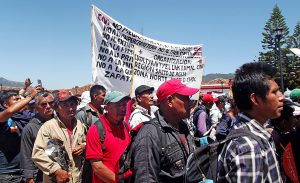
Organization Ikoltyañtyel Lak Lumal, municipality of Salto de Agua during a demonstration of the National Indigenous Congress (CNI) in San Cristóbal de Las Casas in June 2019 © SIPAZ
In May, three years after their forced displacement, 53 families from Puebla Ejido, municipality of Chenalho, organized activities to denounce that they continue to live without the possibility of return. Although they recognize that the state government fulfilled some commitments, there has been no progress towards justice, which is why the impossibility of returning remains. Diego Cadenas Gordillo, Director of the Kuuntik Human Rights Center, also warned that, “there is a price on the heads of representatives and lawyers.”
In June, authorities from Aldama and Chenalho signed a non-aggression pact that they hope will end an agrarian conflict over 60 hectares of territory, between the two municipalities. It has caused dozens of deaths and hundreds of displaced families in the last two years, and has recently intensified. The journalist Elio Enriquez said that, “as long as the inhabitants of both villages (…) remain armed, hopes that there will be no aggressions are few. (…) As long as there is impunity and those responsible for the more than 20 murders are not punished, the residents will not calm down.”
In June, Frayba reported that 28 families were displaced from San Pedro Hidalgo, San Andres Duraznal municipality. In July, it also denounced that in the municipality of Salto de Agua, a group of people violently entered the San Jose El Bascan community and caused the forced displacement of 36 Mayan people belonging to the Ikoltyañtyel Lak Lumal organization, part of the CNI. Finally in August, Frayba reported that four families of the Las Abejas de Acteal Civil Society were attacked and forcibly displaced from the Miguel Utrilla Colony, Los Chorros, municipality of Chenalho. It warned that these new displacements occur “in a regional context of spirals of generalized violence, with more than 7,000 victims of forced displacement, where the actions of state and federal governments are deficient.”
OAXACA: claims against megaprojects
In May, the federal and state governments inaugurated the South Wind Energy Farm, on the Isthmus of Tehuantepec, built with investments from the Japanese company Mitsubishi. The Secretary of Energy, Rocio Nahle, leading the event, highlighted the importance of this construction and acknowledged that it generated social problems and rejection among the inhabitants of the Isthmus. Civil organizations documented several failures in the consultation conducted in 2014 and 2015, including the fact that permits had already been granted and investments were underway when it started. Despite this, the Supreme Court of Justice of the Nation (SCJN in its Spanish acronym) rejected several appeals that had been filed against the project. Fifteen days later, a group of owners of land leased by Mitsubishi took over the electrical substation “for an indefinite period” to demand compliance with several agreements.
In June, the decree of the Interoceanic Corridor of the Isthmus of Tehuantepec was issued. It will permit the start of the project that includes a freight train and the extension of the highway between Salina Cruz (Oaxaca) and Coatzacoalcos (Veracruz), in addition to a tax-free zone to attract investments to the area. This project has generated opposition from several players. Shortly before, the Regional Meeting “The Isthmus is Ours” was held, with the participation of 21 municipalities in the states of Oaxaca and Veracruz. Its participants again denounced that the consultations on this program in March and May were a “means” of legitimizing the imposition of a project that mainly benefits foreign companies, not the indigenous communities in the area. In July, Mixe defenders filed an injunction against the project, stating that “it is intended to be carried out without observing the regulations and protocol guidelines that have been established to safeguard the rights of indigenous peoples.”
In August, communities of the Chatino and Mixteco villages of the Sierra Sur and Costa regions pronounced “the new threat of the construction of a new Hydroelectric Project in the Rio Verde, backed by the company GENERACION ENERSI S.A.” They also pointed out that the Rio Verde “is currently protected by the injunction (…) against the declaration of reserve areas – decrees published at the end of the government of Enrique Peña Nieto-, which was granted by a federal judge and no infrastructure project can be built.” They denounced that, “on the arrival of the government of Andres Manuel Lopez Obrador, SEMARNAT and CONAGUA filed an appeal for review (…). We do not understand why Andres Manuel Lopez Obrador (…) says that he is with the poor and the indigenous, but in his administration he haggles the rights of the people and favors the companies.”
GUERRERO: “The recounting of pain”
In August, the La Montaña Tlachinollan Human Rights Center celebrated its 25th anniversary. The report of the organization entitled “Mountain you are full of hope” “gives an account of the deterioration of the living conditions of the people of Guerrero, because of the violence and the weakness of our institutions, which both business interests and organized crime have taken advantage of. There are a number of red alerts which our state authorities have not been able to address, (…) have overwhelmed our weak rule of law.” In the first five months of 2019, 748 people were killed, which is equivalent to an average of five homicides per day.
Murders and threats are part of the reality faced daily by human rights defenders and journalists. In May, Bertoldo Morales Hilario and Isaias Xantenco Ahuejote, members of the Regional Coordinator of Community Authorities-Founding Peoples (CRAC-PF in its Spanish acronym), municipality of Chilapa de Alvarez, were kidnapped and killed. Both were also promoters of the Indigenous and Popular Council of Guerrero – Emiliano Zapata (CIPOG-EZ in its Spanish acronym), part of the National Indigenous Congress (CNI in its Spanish acronym). The CRAC-PF pointed out as alleged perpetrators a group linked to the criminal gang Los Ardillos. The CNI recalled that, “this cunning crime adds to the recent murder of (…) Lucio Bartolo Faustino and Modesto Verales Sebastian, councilor and delegate of the CNI-CIG, so we denounce the terror policy of the paramilitary narco groups, with the blatant help of the three levels of bad government.”
In June, the newspaper El Sur reported that “the president, the secretary, and the treasurer of the Commissariat of the Communal Assets of Cacahuatepec make infamous and slanderous charges against the general director of this newspaper, Juan Angulo Osorio and the director of the of the Tlachinollan Mountain Human Rights Center, Abel Barrera Hernández,” accusing them – among other things – of making a living from the “generation of violence ”, through the Council of Ejidos and Communities Opposing La Parota Dam (CECOP in its Spanish acronym). El Sur denounced that this is an “attack on freedom of expression that affects everyone who works in this newspaper.”
A few days earlier, the 16 members of the CECOP and the CRAC-PC, who had been arrested in January 2018, after violent events near Acapulco, where six civilians and five community police died, were declared innocent. Tlachinollan’s lawyer, Vidulfo Rosales Sierra, stressed that the court expressed “its concerns about these extremely insufficient investigations, where there was torture, evidence was illegally extracted, where they were also in the Prosecutor’s Office for many days and the defense was not allowed to enter to talk to them.” He called for a route of reconciliation and pacification that “is not only of the parties, but must also come from the State”, recognizing that there are many old disputes in the area.
Among the few advances, in August, four members of the Popular Movement of Teloloapan were released after being imprisoned for more than ten years, accused of kidnapping. They said they would continue to demand the freedom of all political prisoners. The leader of the Francisco Villa Popular Defense Front, Clemencia Guevara Tejedor, said that the president’s position to marginalize social organizations has left activists vulnerable and denounced that in Guerrero there are still 60 political prisoners.

